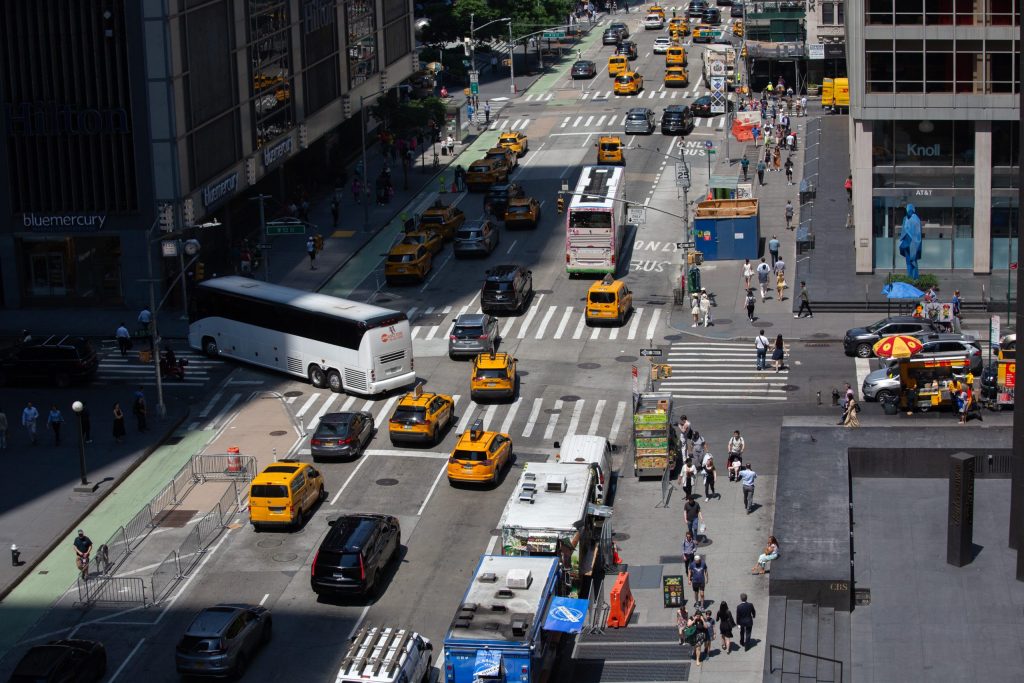The return of former President Donald Trump to the White House could carry big consequences for the financial well being of the country’s largest mass transit system.
As the Republican candidate, Trump pledged in August to “TERMINATE Congestion Pricing in my FIRST WEEK back in office,” vowing to put an end to the Manhattan vehicle-tolling program that Gov. Kathy Hochul paused indefinitely in June.
But with a Tuesday night win putting Trump on track to start his second term as president in January, transit and Albany watchdogs warned Wednesday that the clock is ticking if Hochul is to stand any chance of salvaging the tolling program approved by state lawmakers in 2019.
Following her abrupt halt, Hochul repeatedly pledged to come up by the end of the year with an alternative plan for congestion pricing, which was designed to drastically reduce traffic and fund billions of dollars in MTA capital improvements by tolling vehicles south of 60th Street in Manhattan.
Advocates for the plan that was set to generate billions of dollars for the MTA say the governor needs to act sooner than that.
“The worst-case scenario for congestion pricing has come true,” Lisa Daglian, executive director of the Permanent Citizens Advisory Committee to the MTA said Wednesday morning. “It’s now or never.”
Protestors have for months called on Hochul to flip the switch on tolling infrastructure that has already cost the MTA half a billion dollars after the governor in June said the once-daily tolls would put “undue strain” on motorists driving into the most congested parts of Manhattan.
Rachael Fauss, senior policy advisor for Reinvent Albany, argued that Hochul could still pull it off as long she acts quickly and sticks very closely to the Final Environmental Assessment signed off on by the federal government.
“She has some room to move, but this can’t go to the legislature next season because a new congestion pricing program won’t be approved by the federal government [under Trump],” Fauss said. “The governor has a new deadline and it is not the state budget.”
Hochul’s pause on congestion pricing blew a more than $16 billion hole in the MTA’s current five-year capital program, forcing the transit agency’s board to approve a scaled-back plan. That has led to delays on upgrading signals along multiple subway lines, to making 23 more stations accessible to people with disabilities and to buying the next generation of subway cars.
It also put on ice a state commitment to fund $155 million in environmental mitigation programs into “communities already overburdened by pre-existing air pollution and chronic diseases” as a result of vehicle emissions — and led to a pair of lawsuits seeking to jumpstart congestion pricing.
On top of that, nearly half the funding for the MTA’s new $68.4 billion five-year capital program — which would focus largely on keeping the 120-year-old subway system in safe and working order — is no sure thing.
With Trump’s win likely pointing to less federal funding for public transit than under President Joe Biden, the MTA could be facing its latest crisis.
“No matter what, there will be very hard funding choices to make,” Danny Pearlstein, policy director for Riders Alliance, an advocacy group, said in the wake of Election Night. “The least the governor could do now is follow the law and fund the projects she stopped for political gain earlier this year.”
It was reported at the time that Hochul made the decision to help statewide congressional efforts. New York voters did flip two Republican seats to Democratic candidates on Tuesday.
MTA officials have repeatedly said they take Hochul “at her word” when it comes to finding the money to fund the transit system. When asked last week if he had spoken about the MTA’s priorities with Trump or the Democratic nominee, Vice President Kamala Harris, transit agency head Janno Lieber flatly responded, “No.”
Hochul, whose press office did not immediately respond to a request for comment from THE CITY, said in September that she would “fight to secure as much funding as possible” for the new MTA capital plan, adding that she would pressure Washington “to deliver additional infrastructure dollars.”
The governor is scheduled to address the media about the election at 1 p.m. on Wednesday.
When asked about Hochul’s potential decision, Mayor Eric Adams at his own 11 a.m. press conference said he would back her: “Whatever method she decides I’m in partnership with the governor.”
With Trump going back for a new term as president, advocates fear that securing new federal funding will be a tall order.
“How do we know how priorities can be set?” Pearlstein said. “The best we can do is do everything in our power to ensure that the governor follow the law and be a responsible steward of the transit system she controls.”

